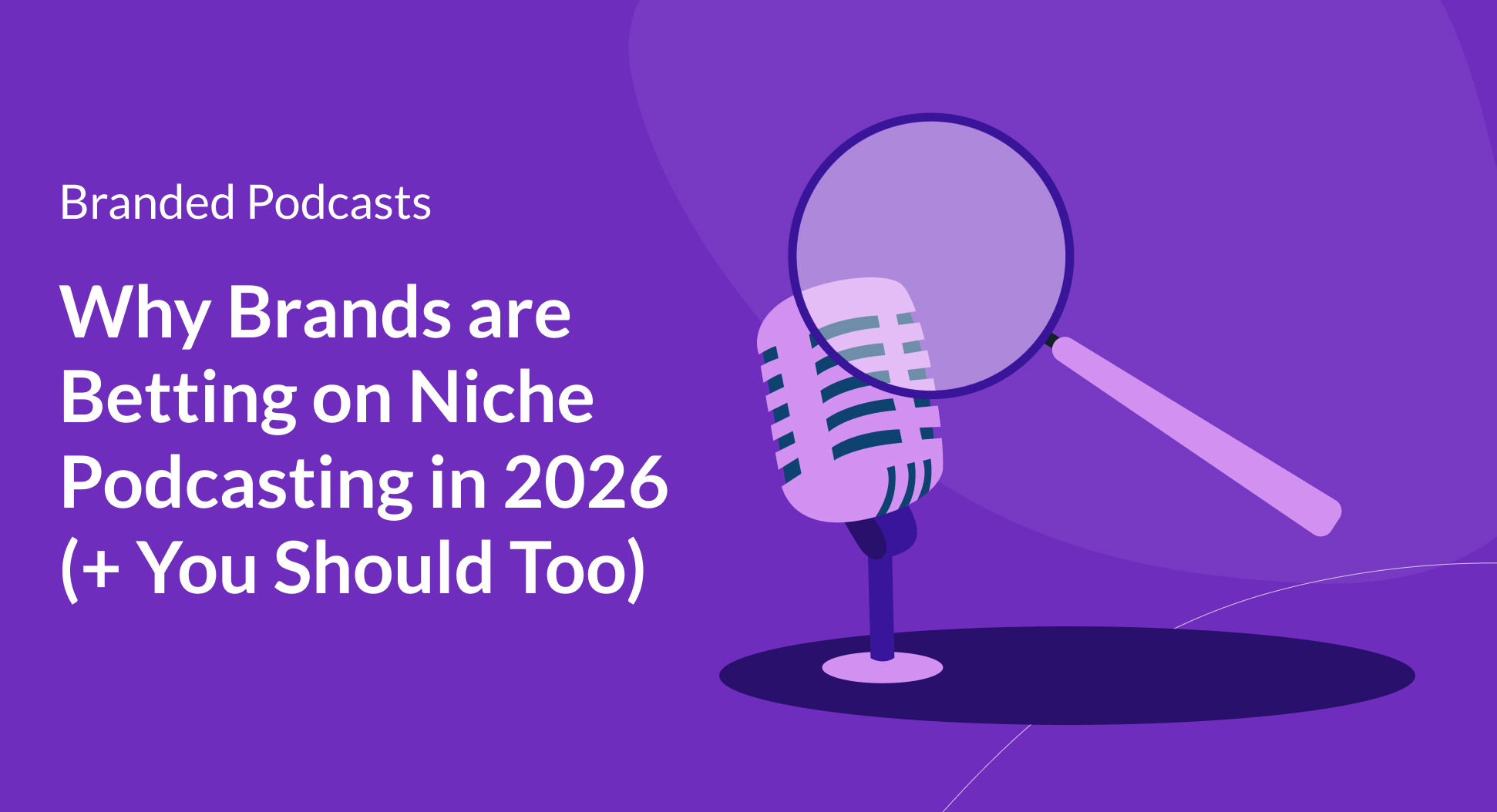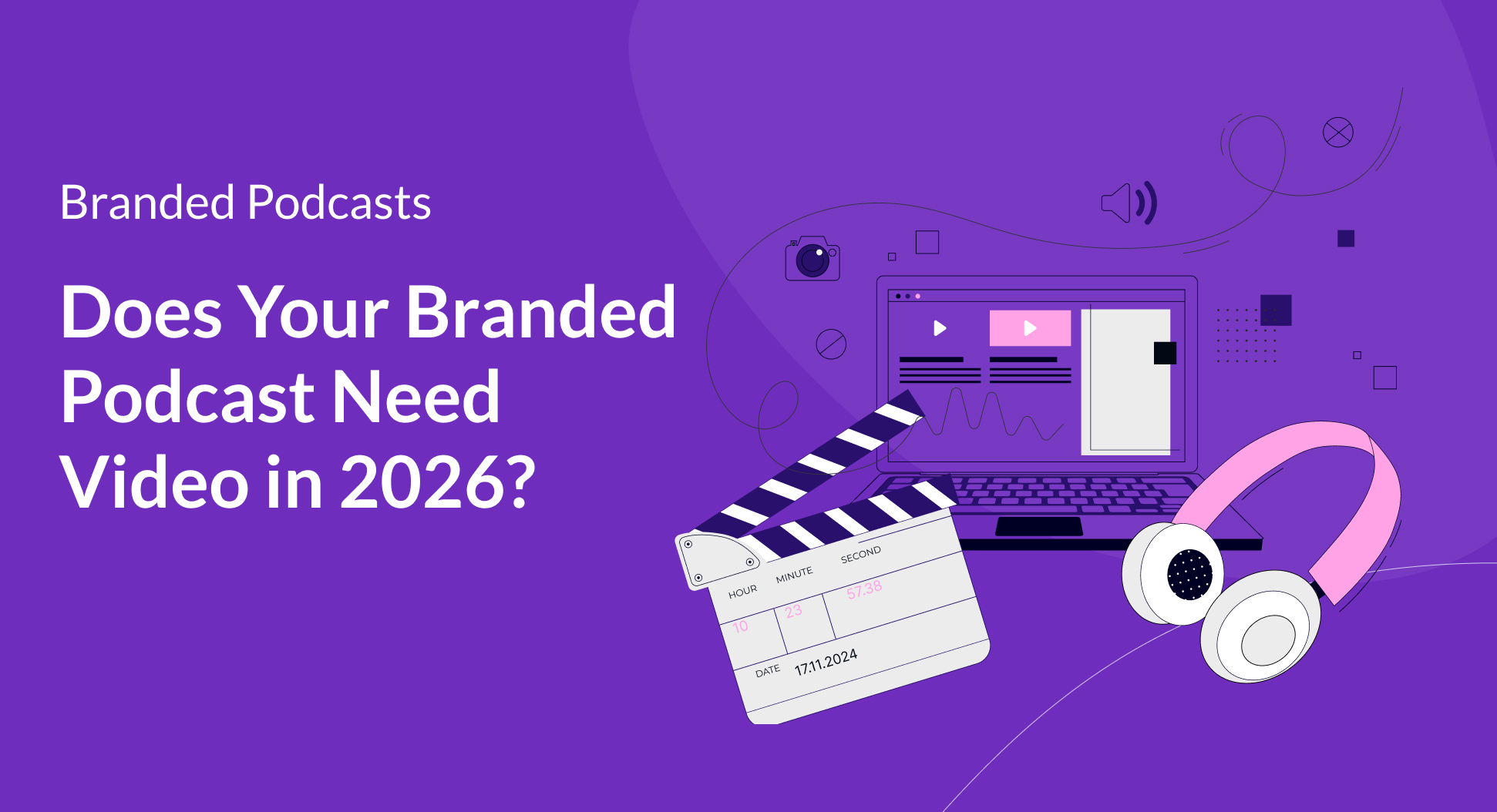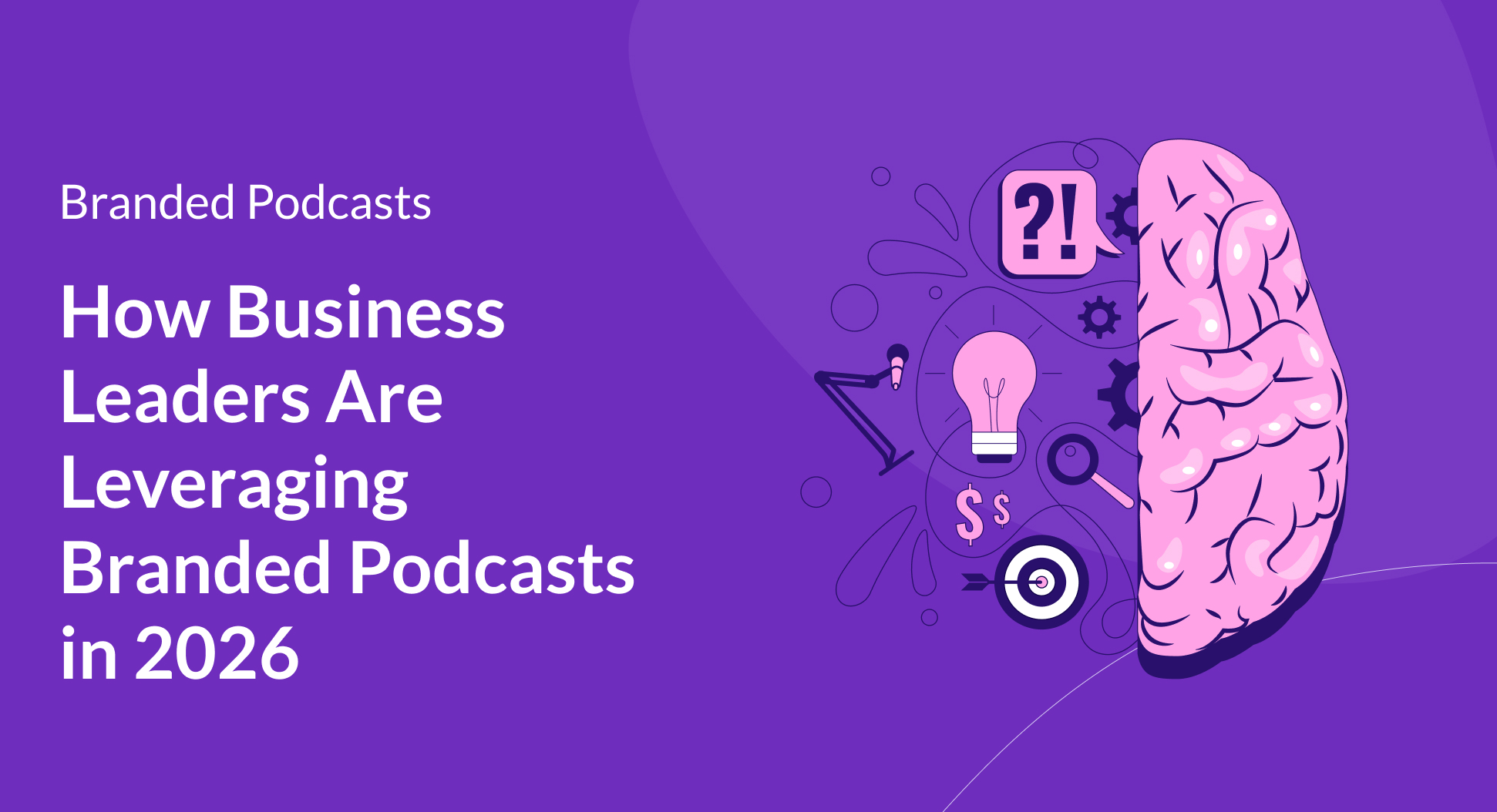Contents
Branded podcasts have been gaining popularity as a B2B marketing channel for several years, and in 2023 they will become even more mainstream with 43% of decision-makers saying they use podcasts to get business-related content.
That being said, B2B marketers are starting to recognize the potential of this medium to reach and engage their target audience while having a substantial impact on networking, branding, and knowledge sharing.
Podcasts provide a unique opportunity for B2B brands to showcase their thought leadership, share industry insights, and build trust with their target audience in a way that is more conversational and authentic than some traditional marketing channels.
So, let’s delve into how to leverage branded podcasts to expand your B2B networks!
1. Establishing thought leadership
Podcasts provide a platform for B2B companies to showcase their expertise, share industry insights, and discuss trends. By consistently delivering valuable and relevant information, your brand becomes a reliable source of information, attracting professionals who are interested in staying informed and connected.

A great example of a podcast that is establishing thought leadership is Shopify’s podcast TGIM which was created for entrepreneurs who can’t wait for the week to start.
The whole premise of the show is to inspire Shopify’s audience of founders by telling success stories of like-minded entrepreneurs and folks who have launched start-ups.
2. Humanizing brands
Podcasts offer a more personal and human touch to B2B branding. Through audio, companies can express their values, culture, and people, creating a connection beyond just products and services.
This humanization helps in building genuine relationships and rapport with clients, partners, and prospects.
In addition, by appearing as guests on each other's podcasts, business leaders can expand their network, establish collaborations, and access potential partners and clients, all while increasing their brand visibility.
A great example of a podcast that humanizes a brand is Inside Trader Joe’s by grocery chain Trader Joe’s which was started five years ago and had a simple premise: what goes into running a grocery store?
Even though it started as a 5-episode series, its popularity has led to it becoming an ongoing podcast. Customers love the show because it’s down-to-earth, relatable, practical, and full of facts and information that the public wouldn’t typically have access to.
3. Networking and relationship-building
Podcasts enable B2B companies to connect with a wide range of industry professionals, experts, and thought leaders. Hosting guests on the podcast or being featured as a guest on podcasts provides opportunities for networking and relationship building.
This can lead to collaboration, partnership, and even potential business deals. Joint projects, co-hosted episodes, or even cross-promotion of each other's content can strengthen relationships and expand your network.
4. Amplifying reach and exposure
Podcasts have a global reach, allowing B2B companies to connect with audiences beyond their immediate geographic location.
This extended reach helps in expanding networks, finding potential clients or partners, and increasing brand visibility on a larger scale.
5. Authentic conversations
Podcasts encourage authentic and in-depth conversations. This authenticity resonates with listeners who appreciate genuine discussions over sales pitches.
Through engaging dialogues, B2B companies can show their industry knowledge, problem-solving capabilities, and commitment to helping clients succeed.
And remember, as soon as you are engaging in authentic and insightful conversations with industry experts you are positioning yourself as a credible and trustworthy partner.
6. Education and knowledge sharing
Podcasts are a valuable educational tool. B2B companies can use podcasts to share industry trends, best practices, case studies, and practical insights. knowledge-sharing not only positions companies as experts in their field, but also helps their target listeners stay informed and empowered.
7. Convenience and accessibility
Podcasts fit seamlessly into busy professionals' lives.
They can be consumed while commuting, working out, or doing other tasks. This convenience makes it easier for B2B audiences to access valuable content, strengthening their connection with the brand.
8. Engaging storytelling
Podcasts offer a platform for storytelling. B2B companies can share their journey, successes, failures, and client stories. Engaging storytelling creates an emotional connection and helps listeners relate to the company's mission and values.
The Message by General Electric (GE) is a science fiction podcast in a journalistic style. In the podcast, scientists work to decode extraterrestrial messages using real technology developed and sold by GE.
The brilliance of the show lies in its uniqueness. No other multinational organization that focused on aviation, power, renewable energy, digital industry, and venture capital was putting out content that was this engaging. Historically, these industries are seen as stuffy, conservative, and unrelatable.
GE was able to turn that on its head via its podcast. The Message continues to put out engaging stories that listeners can enjoy while communicating the brand messaging about existing GE technologies.
9. Data-driven insights
Podcasting platforms provide valuable listener data, allowing B2B companies to analyze metrics such as:
- Download numbers
- Listener demographics (age, gender, household income, interests, social media consumption)
- Engagement rates (consumption rates, listen-through rates)
- B2B Analytics (which companies are listening to your show along with their location, size, industry, and revenue)
These insights help tailor content to the audience's preferences and optimize the impact of the podcast.
10. Event and conference promotion
If your brand hosts or participates in industry events or conferences, your podcast can serve as a platform to promote these events. This can lead to attendees connecting with you in person, further strengthening relationships.
Through a branded podcast, companies can encourage listeners to sign up for the event, providing a direct lead generation channel. By offering exclusive discounts or early-bird registration for podcast listeners, brands can convert podcast listeners into event attendees.
11. Bonus: B2B analytics tools
CoHost’s B2B Analytics helps brands measure their podcast's impact and show them exactly which companies they are building relationships with. This data can be combined with other podcast or company metrics to develop further valuable insights. Such as:
- Tracking engagement metrics so you can see the number of downloads, listens, and shares for each episode can help you determine which topics are resonating with your audience.
- Listener demographics so you can understand your listener profile – including their industry, roles, company size, and geographic location. This helps you understand who your podcast is reaching and whether it aligns with your target audience.
- Conversion tracking allows you to see if you promote specific offers, products, or services in your podcast, and how many listeners are converting as a result of your podcast. This provides a direct link between your podcast and business outcomes.
- Relationship mapping involves associating listeners with their respective companies based on the data they provide or by integrating with customer relationship management (CRM) systems. This way, you can understand which companies are engaging with your podcast.
- Company identification allows you to analyze IP addresses and data sources and in turn, can identify the companies that are accessing your podcast content. This data can be used to create a list of companies engaging with your podcast.
- Integration with CRM systems or other marketing automation platforms enables you to merge podcast engagement data with existing customer data, providing a comprehensive view of your relationships with various companies.
Some great B2B analytics tools on the market that you might benefit from, include:
- CoHost equips brands and agencies with sophisticated tools to better understand who their listeners are and the impact that the podcast has on the brand. With CoHost, podcasters have access to valuable and unique insights into their audience, performance, and marketing campaigns so they can understand what does and does not drive growth.
- Megaphone (by Spotify) is an enterprise-grade podcast hosting and analytics suite for content creators and brand advertisers. Their client list includes names like WSJ, Disney, Bloomberg, and LinkedIn.
- Podbean is another popular podcast hosting, monetization, and analytics platform. It provides podcast performance insights such as listeners, downloads, followers, comments, and likes.
- Castos easily tracks podcast performance insights, such as top episodes, listener’s behavior, demography, and more.
By utilizing such a tool, brands can measure the impact of their podcasting efforts more effectively and understand how their podcast contributes to their B2B network expansion and relationship-building endeavors.
Are you ready to expand your B2B network with a branded podcast?
Podcasting has evolved into a dynamic tool for B2B companies to foster meaningful relationships, establish credibility, and create a bridge for knowledge-sharing within their industries.
As the podcasting landscape continues to grow, companies that effectively leverage this medium can gain a competitive advantage in networking, branding, and sharing valuable insights.
Remember, podcast episodes remain accessible long after their initial release. This longevity means that the content continues to attract new listeners and provides ongoing value, contributing to prolonged networking and brand exposure.
If you’d like to learn more, feel free to get in touch with the team at Quill.

.avif)




.png)

.png)




.png)
.png)
.png)
.png)